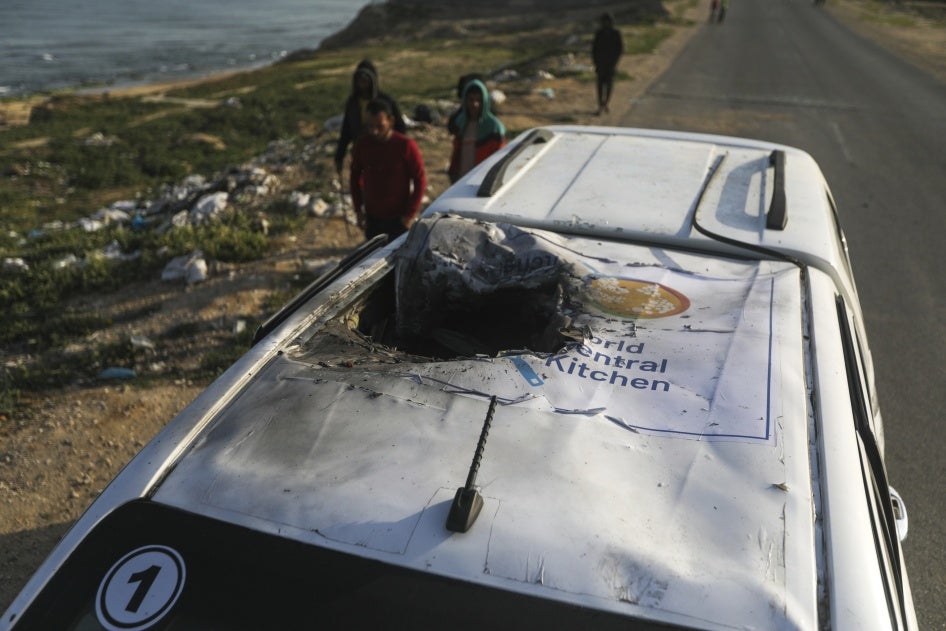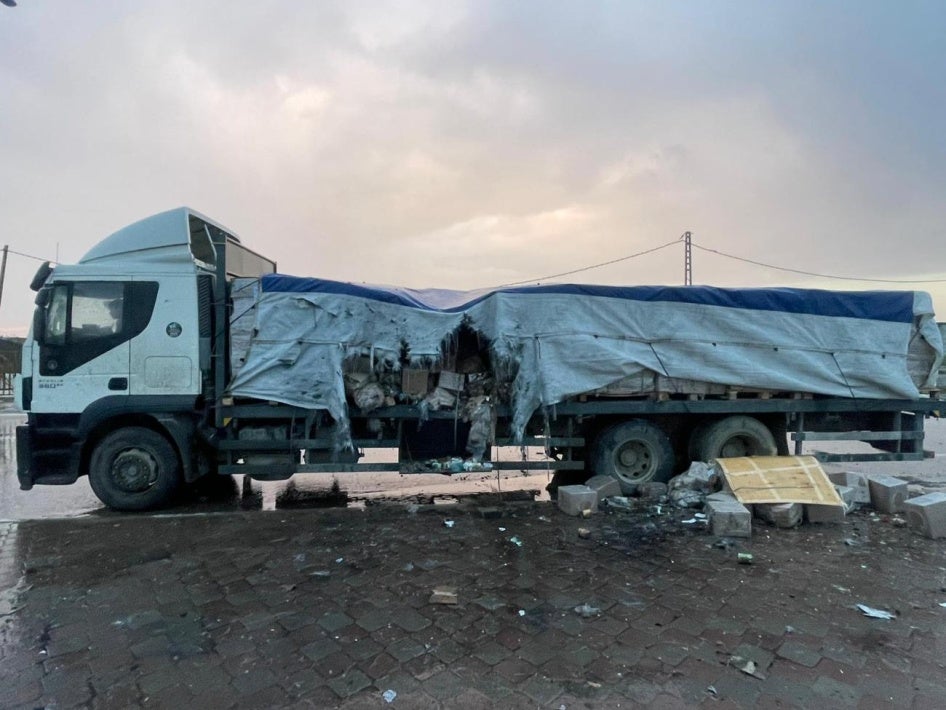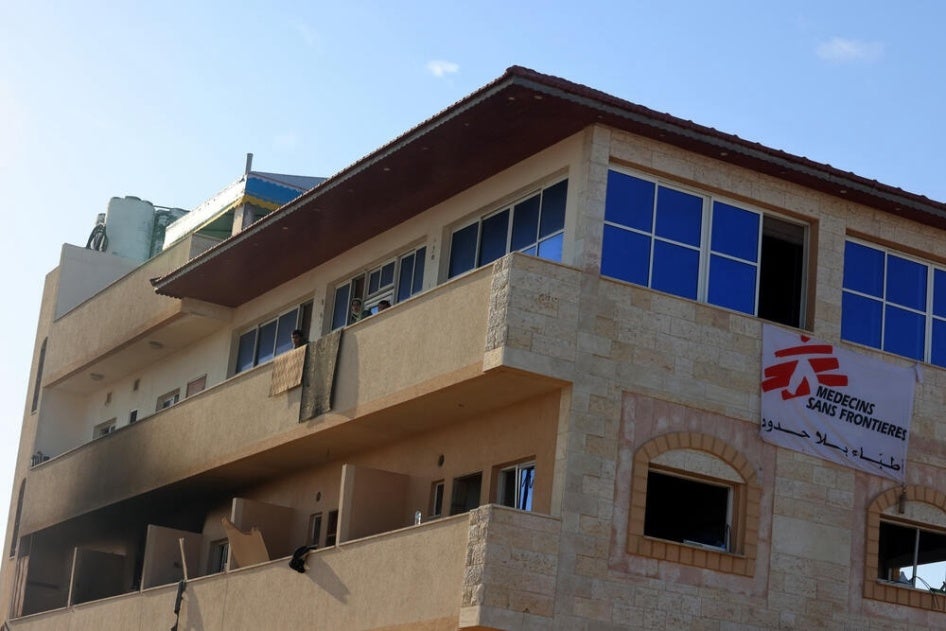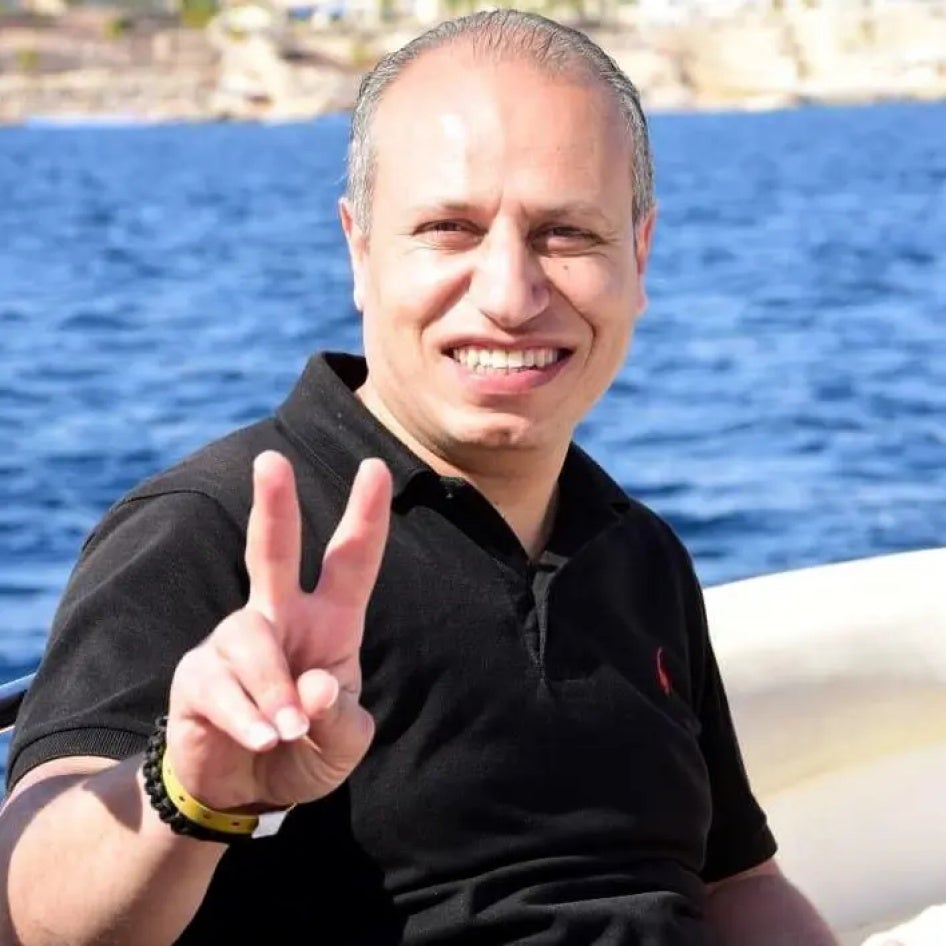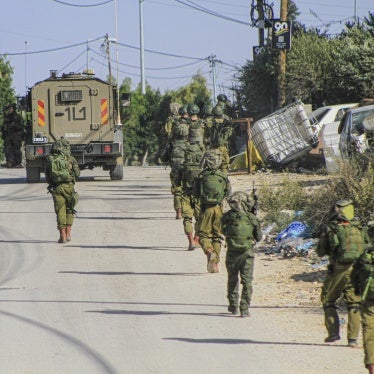Gaza: Israelis Attacking Known Aid Worker Locations
End Unlawful Attacks, Ensure Accountability
.
.
(Jerusalem) – Israeli forces have carried out at least eight strikes on aid workers’ convoys and premises in Gaza since October 2023, even though aid groups had provided their coordinates to the Israeli authorities to ensure their protection, Human Rights Watch said on 14 May 2024.
Israeli authorities did not issue advance warnings to any of the aid organizations before the strikes, which killed or injured at least 31 aid workers and those with them. More than 250 aid workers have been killed in Gaza since the October 7 assault in Israel, according to the UN.
One attack on January 18, 2024, injured three people who were staying in a joint guest house belonging to two aid organizations and was most likely carried out with a US-made munition, according to one of the organizations and to a report by UN investigators who visited the site after the attack, which Human Rights Watch reviewed.
One of the aid organizations, Medical Aid for Palestinians (MAP), said UN inspectors concluded that the bomb was delivered by an F-16 aircraft. F-16 aircraft use British made components according to campaigners.
The eight incidents reveal fundamental flaws with the so-called deconfliction system, meant to protect aid workers and allow them to safely deliver life-saving humanitarian assistance in Gaza.
“Israel’s killing of seven World Central Kitchen aid workers was shocking and should never have happened under international law,” said Belkis Wille, associate crisis, conflict, and arms director at Human Rights Watch. “Israel’s allies need to recognize that these attacks that have killed aid workers have happened over and over again, and they need to stop.”
Israel’s attack on April 1 on the World Central Kitchen convoy, which killed seven workers, far from being an isolated “mistake,” is just one of at least eight incidents that Human Rights Watch identified in which aid organizations and UN agencies had communicated with Israeli authorities the GPS coordinates of an aid convoy or premises and yet Israeli forces attacked the convoy or shelter without any warning.
In these eight incidents, Israeli forces killed at least 15 people, including 2 children, and injured at least 16 others. Five of these attacks were the subject of a recent New York Times investigation that included visual evidence and internal communications between aid organizations and the Israeli military.
The other seven attacks are:
- Attack on a Médecins Sans Frontières (MSF or Doctors without Borders) convoy, November 18, 2023
- Attack on a guest house of the United Nations Relief and Works Agency for Palestine Refugees in the Near East (UNRWA), December 9, 2023
- Attack on an MSF shelter, January 8, 2024
- Attack on an International Rescue Committee (IRC) and Medical Aid for Palestinians (MAP) guest house, January 18, 2024
- Attack on an UNRWA convoy, February 5, 2024
- Attack on an MSF guest house, February 20, 2024
- Attack on a home sheltering an American Near East Refugee Aid Organization (Anera) employee, March 8, 2024
As of April 30, the UN reported that 254 aid workers had been killed in Gaza since October 7, 2023, with UNRWA personnel accounting for 188 of these fatalities. On May 13, a UN vehicle was hit on the way to a hospital in Gaza, killing at least one UN staff member and injuring at least one more. According to UNRWA, 169 of its facilities have been affected by the hostilities in 368 incidents and at least 429 displaced people have been killed in UNRWA shelters. Israeli forces have, according to the UN, also shot at and shelled people congregating to collect aid, killing and injuring hundreds. These attacks are having a chilling effect on efforts to provide lifesaving aid in Gaza.
Aid workers have also been unable to leave Gaza, since Israeli forces seized control of and closed the Rafah Crossing on May 7.
During a recent trip to Cairo and northern Sinai, near the border between Egypt and Gaza, Human Rights Watch met with staff from 11 humanitarian organizations and UN aid agencies operating in Gaza who said that Israeli attacks on aid workers had forced them to take various measures that for some included suspending activities for a period of time, reducing their staff inside Gaza, or severely restricting their aid activities in other ways.
“I can’t risk sending more staff into Gaza because I cannot rely on deconfliction as a way of keeping them safe,” a senior employee from one of the organizations whose guest house was attacked told Human Rights Watch. He said this was a key factor in limiting the organization’s ability to provide medical services. “You can build docks and send shipments, but without a safe operating environment, you will have a pile up of shipments that people aren’t able to deploy safely to help people.”
This pattern of attacks despite proper notification of Israeli authorities raises serious questions about Israel’s commitment and capacity to comply with international humanitarian law, which some countries, including the UK, rely on to continue to license arms exports that end up in Israel.
Human Rights Watch has found that Israeli authorities are using starvation as a method of warfare in Gaza. Pursuant to a policy set out by Israeli officials and carried out by Israeli forces, the Israeli authorities are deliberately blocking the delivery of water, food, and fuel, willfully impeding humanitarian assistance, apparently razing agricultural areas, and depriving the civilian population of objects indispensable to its survival. Children in Gaza have been dying from starvation-related complications.
Israel has not responded to a Human Rights Watch letter sent on May 1, requesting specific information about the attacks on aid workers documented in this report.
The laws of war prohibit attacks that target civilians and civilian objects, that do not discriminate between civilians and combatants, or that are expected to cause harm to civilians or civilian objects that is disproportionate to any anticipated military advantage. Indiscriminate attacks include attacks that are not directed at a specific military target or use a method or means of combat whose effects cannot be limited as required.
Warring parties must take all feasible precautions to minimize harm to civilians, including by providing effective advance warnings of attacks unless circumstances do not permit, and by sparing civilians under their control from the effects of attacks. Serious violations of the laws of war committed by individuals with criminal intent – that is, deliberately or recklessly – are war crimes.
Israel should make public the findings of investigations into attacks that have killed and injured aid workers, and into all other attacks that caused civilian casualties. The Israeli military’s long track record of failing to credibly investigate alleged war crimes underscores the importance of the International Criminal Court’s (ICC) inquiry into serious crimes committed by all parties to the conflict.
Israeli and Palestinian officials should cooperate with the ICC in their work, Human Rights Watch said. Israel should also provide the Independent International Commission of Inquiry on the Occupied Palestinian Territory, including East Jerusalem, and Israel access to Gaza to conduct its investigations.
Given the pattern of attacks on aid groups that have provided Israeli authorities with proper information about their locations, a group of recognized international experts should conduct an independent review of the humanitarian deconfliction process. Israel should give these experts full access to its processes, including the coordination and communications that occur before, during, and after such attacks as well as information regarding any alleged military target in the vicinity and any precautionary measures taken to mitigate harm.
Israel’s allies, including the United States and United Kingdom – both states sending the weapons parts apparently used in at least one of the documented attacks – should suspend military assistance and arms sales to Israel so long as its forces commit systematic and widespread laws-of-war violations against Palestinian civilians with impunity. Governments that continue to provide arms to the Israeli government risk complicity in war crimes.
They should also use their leverage, including through targeted sanctions, to press Israeli authorities to cease committing grave abuses and enable the provision of humanitarian aid and basic services in Gaza, in accordance with Israel’s obligations under international law and recent International Court of Justice (ICJ) orders to Israel in the case brought by South Africa concerning alleged violations of the Genocide Convention.
“On one hand, Israel is blocking access to critical lifesaving humanitarian provisions and on the other, attacking convoys that are delivering some of the small amount that they are allowing in,” Wille said. “Israeli forces should immediately end their attacks on aid organizations, and there should be accountability for these crimes.”
For details of attacks on the aid organizations, please see below.
Attack on the World Central Kitchen Workers
On April 1, just before 11 p.m., Israeli forces carried out a drone strike with three missiles targeting a convoy of three World Central Kitchen (WCK) vehicles, two marked with the organization’s logo on the roof, in central Gaza, all carrying civilians, that were escorting eight aid trucks. The attack killed seven aid workers. The convoy had just left a food warehouse in Deir al-Balah and was traveling a route that the organization said they had agreed upon with the Israeli military. The attack was reportedly carried out by an Israeli-made Hermes 450 drone.
After the attack, WCK paused its operations in Gaza for several weeks, as did American Near East Refugee Aid (Anera). At the time, the two groups had together been providing an average of 300,000 meals across Gaza daily. Photographs of the damaged vehicles were initially verified by the independent investigative collective Bellingcat and later independently verified by Human Rights Watch researchers.
A preliminary Israeli investigation into the attack found that Israeli forces’ conduct was “contrary to the Standard Operating Procedures” and had occurred because of “a grave mistake,” including a lack of coordination between different levels of the army and the mistaken identity of a man in one of the vehicles, according to the Israeli armed forces. The preliminary investigation also found that the two additional drone missiles were fired against army protocol.
In its response, WCK reiterated its call for an independent commission to investigate the incident because, it said, the “[Israeli Defense Forces] cannot credibly investigate its own failure in Gaza.” WCK resumed its operations in late April because, it said, “The humanitarian situation in Gaza remains dire,” but said it had still received “no concrete assurances” that the Israeli military’s operational procedures had changed.
This incident elicited widespread condemnation, including from leaders of countries whose citizens were killed in the attack, including United States President Joe Biden, United Kingdom Prime Minister Rishi Sunak, Australian Prime Minister Anthony Albanese, and Canadian Prime Minister Justin Trudeau.
Attack on a Médecins Sans Frontières (MSF) Convoy, November 18
On November 18, 2023, armed forces attacked a convoy of five marked MSF vehicles, killing two people, witnesses said. The group had been trying to evacuate 137 civilians from its guesthouse near al-Shifa Hospital in Rimal, northern Gaza, where they had been trapped for a week, to southern Gaza. MSF said that it had coordinated the convoy’s movement with the Israeli armed forces and followed the route prescribed by the army. Once the convoy reached a crowded checkpoint near Wadi Gaza, Israeli soldiers did not allow the vehicles to clear the checkpoint for hours.
When gunfire rang out near the checkpoint, MSF staff, who were still waiting to go through the checkpoint, decided to return to the guest house, 7.5 kilometers to the north. They said they maintained contact with the Israeli Coordination and Liaison Administration (CLA), the military unit responsible for the coordination of access to and from Gaza in connection with the facilitation of civilian and humanitarian needs, throughout their travel back and informed them that the convoy had to return to their guest house.
As they were approaching their office, between 3:30 and 4 p.m., MSF said that the Israeli army attacked the convoy, hitting two of the vehicles. The organization quoted one staff member as saying: “I was terrified when I saw that the snipers and the tanks were pointing their weapons at us, especially at the fourth and the fifth van [in the convoy].” MSF said that the staff there during the incident saw no military targets in the area. The organization has requested an explanation from Israeli authorities, but has received no response, a representative told Human Rights Watch.
“This incident shows just how ineffective the coordination mechanisms put in place by Israeli authorities have been,” said the representative of MSF. In this instance, “The latter appeared to have little or no influence on the operational troops on the ground, including to let the vehicles pass through the checkpoint.”
This failed coordination with the CLA has been cited in previous UN reporting.
Attack on a Guest House of the United Nations Relief and Works Agency for Palestine Refugees in the Near East (UNRWA), December 9
On December 9, the Israeli navy fired 20mm cannon rounds at an UNRWA guest house consisting of two buildings in Rafah, Gaza’s southernmost governorate, the agency told Human Rights Watch. The rounds damaged the west side of both buildings. The attack occurred late in the evening, while 10 staff were asleep inside. The agency said it had shared the coordinates of the guest house with Israeli authorities on a regular basis prior to the attack, including on the date of the attack, and was not aware of any military targets in the area at the time. UNRWA told Human Rights Watch that it had received no warning of the attack. Following the attack, the deputy commander of the Israeli Southern Command told UNRWA that the attack had been carried out in error, UNRWA told Human Rights Watch.
Attack on an MSF Shelter, January 8
On January 8, an Israeli projectile pierced the side of a building in which over 100 MSF staff and their families were sheltering in Khan Yunis, MSF said. The strike killed the 5-year-old daughter of an MSF worker and injured four people. At the time, the staff saw no military targets in the area and received no warning of the attack, which took place in an area under no evacuation order, the organization told Human Rights Watch. The organization said it had shared the coordinates of the building with Israeli authorities on a regular basis, saying it was being used as an MSF shelter.
MSF published a video in which Léo Cans, the MSF head of mission for Palestine, described the attack and showed two parallel holes in the wall that munitions had passed through, he said. The video also included two photographs of remnants lying on the grass, allegedly outside the building. Human Rights Watch could not confirm the location of these remnants but was not able to find them online prior to January 8. TheNew York Timesanalyzed the photographs and reported that they showed the remnants of an Israeli 120mm tank shell with Hebrew markings outside the shelter. Human Rights Watch independently verified the type of remnants.
The Israeli military denied to the New York Timesthat it had struck the building. However, MSF said that Israeli authorities later told the organization that the damage to the guest house had been collateral in an attack on a “terror” target.
Attack on an International Rescue Committee (IRC) and Medical Aid for Palestinians (MAP) Guest House, January 18
On January 18, an Israeli air attack hit the perimeter wall around a guest house being used by both the IRC and MAP north of Khan Younis, where 12 people, including 4 doctors, were staying at the time, according to the 2 organizations. No one was killed in the strike but three people suffered light injuries, MAP told Human Rights Watch.
Satellite analysis shows the attack left a roughly 15-meter-wide crater in the sandy ground, destroyed the wall marking the perimeter of the property, and significantly damaged the house. MAP confirmed to Human Rights Watch that the organization had shared the coordinates of the guest house with the Israeli authorities and with the UN twice in late 2023 to ensure it did not come under attack. The building stands alone, with no other buildings or structures around it, and MAP said they knew of no military targets in the area at the time of the attack and received no warnings.
Human Rights Watch reviewed a report of an on-site independent assessment by a multi-agency UN team after the attack, which concluded that the damage was the result of an airstrike, most likely involving a US-made guided GBU-32 air-dropped bomb. MAP said inspectors concluded that the bomb was delivered by an F-16 aircraft. The organizations said that, since the attack, Israel has provided six different and often contradictory explanations as to whether and why the attack took place, but they said the explanations had not provided clarity or accountability.
Attack on an UNRWA Convoy, February 5
On February 5, Israeli naval gunfire hit an UNRWA aid truck, the agency said. The attack occurred while a convoy of 10 trucks flanked by marked UN vehicles were parked on a road in western Nuseirat, waiting at a previously agreed holding point for permission from the Israeli military to proceed to an Israeli checkpoint. The shelling damaged the last truck in the convoy. No one was injured. UNRWA said it had coordinated with Israeli authorities the planned movement of trucks prior to the attack, including reporting to Israeli authorities when the convoy had reached the holding point and when aid workers in the convoy began to hear naval gunfire in proximity to the stationary convoy.
Because of this incident, UNRWA and its partners had to pause assistance activities to northern Gaza, affecting 200,000 people, for 19 days, a UNRWA representative said. Since March 24, the Israeli government has restricted access to northern Gaza for UNRWA , refusing to allow UNRWA to provide food assistance to the north, despite UNRWA’s mandate. Israeli authorities have taken other steps that have undermined the ability of UNRWA to distribute aid in Gaza, which has contributed to the dire humanitarian situation, given that UNRWA has maintained the largest humanitarian aid operation in Gaza.
The Israeli military told CNN the same day that it was looking into the incident. An UNRWA official told Human Rights Watch that Israeli authorities have since acknowledged the attack and said they have put in place “prevention measures to prevent another such occurrence.”
Attack on an MSF Guest House, February 20
Just after 8 p.m. on February 20, an Israeli tank fired a medium- to large-caliber weapon at a multi-story apartment building in al-Mawasi neighborhood of Khan Younis housing only MSF staff and their families, 64 people in all. The attack killedtwo people and injured seven others. MSF said that the weapon was an Israeli tank shell. It said that staff saw no military objects in the area at the time and received no warning.
Photographs and videos included in a Sky News report on the attack and reviewed by Human Rights Watch confirm that a large MSF flag was draped on the outside of the building at the time of the attack. The images and satellite imagery also show that the building is secluded, with the nearest buildings approximately 50 meters away.
MSF said that armed forces fired additional rounds at the building’s exterior and the interior of the ground floor. It told Human Rights Watch that an independent investigation, which was corroborated by witness accounts, confirmed that there had been an Israeli tank in the area at the time of the incident. The investigation found that the projectile causing the explosion was fired by an Israeli Merkava tank. The small-caliber bullet impacts on the building are consistent with the secondary armament of Merkava tanks, it also concluded.Human Rights Watch verified a photograph posted on X (formerly known as Twitter) by MSF on February 22, showing damage to the exterior of the building.
MSF said that the organization had shared the coordinates of the building with the Israeli authorities prior to the attack. It received no warning. MSF said that, after the attack, Israeli authorities reconfirmed that they had received the coordinates of the building.
In response to the attack, the Israeli army told Sky News the tank opened fire on the building because it had been “identified as a building where terror activity is occurring.” It committed to an examination by the Israeli Army’s General Staff’s Fact Finding and Assessment Mechanism, a permanent “independent” body established in 2014 to examine “exceptional incidents” that take place during military operations. No results have been made public.
“These killings underscore the grim reality that nowhere in Gaza is safe, that promises of safe areas are empty and deconfliction mechanisms unreliable,” Meinie Nicolai, MSF general director, told Sky News after the incident.
Attack on a Home Sheltering an American Near East Refugee Aid (Anera) Employee, March 8
On October 13, Doaa Shawwa, her husband Mousa Shawwa, and their children Dima, 13, and Karim, 6, fled their home in Tal al-Hawa and moved into the second-floor apartment of a friend in al-Zuwaida, in a building with three apartments further south. The attack killed at least three people and injured at least three more. Doaa told Human Rights Watch the neighborhood had avoided the worst of the hostilities over the subsequent months. Mousa was the Anera supply and logistics coordinator, and, upon moving to al-Zuwaida, he had communicated the coordinates of the home with his Anera colleagues, the organization confirmed.
Anera showed the New York Timesemails it had sent to Israeli authorities in which it included the coordinates of the house, as well as photographs of the building, informing them that this was where one of their workers was living with his family. In the emails, Israeli authorities confirmed that the location was being “processed” in their “system.”
On Friday, March 8, at about 4 p.m., an Israeli strike hit the building without warning, Doaa said. Mousa was standing in the doorway of the apartment with Doaa’s visiting brother, Baha al-Gifri, speaking to Doaa when the strike hit. “He was halfway through his sentence when we were hit. I don’t remember anything from that moment, I lost consciousness immediately and only woke up later in the hospital to find out that I had lost Mousa and my brother,” she said.
Mousa had injuries all over his body and died as he arrived at al-Aqsa Hospital, Doaa said she was later told. Baha died at the moment of impact, with wounds to his head and face. Doaa’s 6-year-old son, Karim, had a head injury, but medical staff did not realize he had a skull fracture and internal bleeding in his brain, so his injuries went initially untreated. He died at al-Arish Hospital in Egypt, 11 days after the attack.
With the assistance of Anera, Doaa, Karim, and Dima had been transferred to Egypt from Gaza eight days after the attack. The attack fractured Doaa’s right hand and caused a large wound to her face and head. It fractured Dima’s right foot, and covered her body and face with wounds from metal fragments. Dima also had burns on her right hand. A friend who owned the home in Gaza where they were attacked also had burns on his face, Doaa said.
Doaa said that, as far as she knew, the other two apartments in their building had only been housing civilians, and that she knew of no presence of armed forces in the neighborhood. Human Rights Watch verified Al Jazeera footage, posted on YouTube on March 9, of the building after the attack which shows considerable damage to the second floor of the building, and experts consulted by the New York Times concluded the attack was carried out with a precision-guided air-dropped munition. Israel told the New York Timesin response to its request for comment that the attack had targeted a Hamas member who participated in the October 7 assault in Israel. Anera said it had received no information from Israel about who or what had been targeted, or why.
“We did not receive any warning from the Israelis before the attack,” Doaa said. “This is the thing that upsets me the most. My husband works for an American organization and the Israelis knew we were there. They should have sent us a message to warn us to get out. Why didn’t they?” Doaa said she keeps asking herself. “This was something beyond our imagination. Our hearts were destroyed.”
MORE READING:
*SOURCE: Human Rights Watch. Go to ORIGINAL: https://www.hrw.org/news/2024/05/14/gaza-israelis-attacking-known-aid-worker-locations
Source: https://human-wrongs-watch.net/2024/05/14/gaza-israelis-attacking-known-aid-worker-locations/
Anyone can join.
Anyone can contribute.
Anyone can become informed about their world.
"United We Stand" Click Here To Create Your Personal Citizen Journalist Account Today, Be Sure To Invite Your Friends.
Lion’s Mane Mushroom
Mushrooms are having a moment. One fabulous fungus in particular, lion’s mane, may help improve memory, depression and anxiety symptoms. They are also an excellent source of nutrients that show promise as a therapy for dementia, and other neurodegenerative diseases. If you’re living with anxiety or depression, you may be curious about all the therapy options out there — including the natural ones.Our Lion’s Mane WHOLE MIND Nootropic Blend has been formulated to utilize the potency of Lion’s mane but also include the benefits of four other Highly Beneficial Mushrooms. Synergistically, they work together to Build your health through improving cognitive function and immunity regardless of your age. Our Nootropic not only improves your Cognitive Function and Activates your Immune System, But it benefits growth of Essential Gut Flora, further enhancing your Vitality.
Our Formula includes:
Lion’s Mane Mushrooms which Increase Brain Power through nerve growth, lessen anxiety, reduce depression, and improve concentration. Its an excellent adaptogen, promotes sleep and improves immunity.
Shiitake Mushrooms which Fight cancer cells and infectious disease, boost the immune system, promotes brain function, and serves as a source of B vitamins.
Maitake Mushrooms which regulate blood sugar levels of diabetics, reduce hypertension and boosts the immune system.
Reishi Mushrooms which Fight inflammation, liver disease, fatigue, tumor growth and cancer. They Improve skin disorders and soothes digestive problems, stomach ulcers and leaky gut syndrome.
Chaga Mushrooms which have anti-aging effects, boost immune function, improve stamina and athletic performance, even act as a natural aphrodisiac, fighting diabetes and improving liver function.
Try Our Lion’s Mane WHOLE MIND Nootropic Blend 60 Capsules. Today Be 100% Satisfied Or Receive A Full Money Back Guarantee Order Yours Today By Following This Link.




